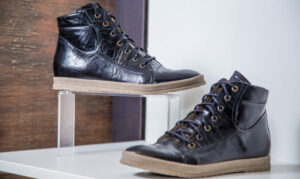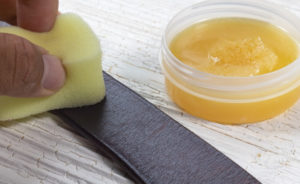Using olive oil for leather items
In one of our previous articles, we talked about using vaseline on leather but is olive oil good for leather goods as well?
Without proper care and maintenance, your leather items can quickly become dry and brittle leading to cracking and discoloration. And that’s where olive oil comes in.
Olive oil has been used for centuries for cooking and skincare, but it is also an effective solution for leather care.
In this article, we will look at the benefits of using olive oil on leather, the potential drawbacks, and how to use it properly so as not to damage your leather items.

Is olive oil good for leather?
Yes, olive oil is generally considered good for leather because it is a natural oil that contains antioxidants and vitamins that can help to moisturize and protect the leather. However, it should be used in moderation to keep the leather soft, supple, and protected from environmental factors.
Benefits of using olive oil on leather
There are several benefits of using olive oil on leather, including:
1. Softens leather
Over time, leather can become stiff and brittle due to the loss of natural oils and exposure to elements, which can make it prone to cracks and tears.
In addition, the stiffness makes leather less comfortable to wear or use as it causes it to lose its natural shape and form.
Olive oil helps to replenish the natural oils that have been lost over time and restore the material to its original soft and supple condition.
This makes the leather more pliable and less prone to cracks and tears, which prevents damage.
2. Moisturizes and conditions leather
Moisturizing and conditioning leather is crucial to maintaining its natural appearance and longevity.
Over time, leather can become dry and lose its natural oils, which can lead to cracks and a loss of shine.
When leather becomes dry, it can also become brittle and prone to tears and damage, which necessitates the need to condition and moisturize it.
Olive oil contains antioxidants and vitamins that help to nourish the leather. So, conditioning your leather shoes, boots, and furniture using olive oil helps to replenish the natural oils that have been lost over time.
This also helps to prevent cracks and tears and keeps the leather well-moisturized.
3. Protects leather from elements
Exposure to the sun and other environmental factors, such as extreme temperatures and humidity, can cause the leather to dry out and become prone to cracks and tears.
The antioxidants in olive oil can help to protect the leather from damage caused by these environmental factors. The antioxidants work by neutralizing the free radicals in the leather and thereby prevent damage over time.
In addition, the oil itself can also help to protect the leather from moisture. Moisture can cause the leather to become prone to mold and mildew, which discolors it and causes a musty odor.
So, using olive oil as a leather conditioner can help to protect the material from the damaging effects of the sun, moisture, and other environmental elements.
4. Restores natural color
Over time, your leather items can become faded and discolored, which can affect their appearance.
The natural oils in olive oil can help to maintain the leather’s natural color and texture, preventing it from fading and discoloration.
These oils can help to nourish and hydrate the leather, keeping it looking and feeling great.
In addition to its hydrating properties, the antioxidants in the oil keep the leather from fading by protecting it from harsh weather elements.
5. Olive oil is all-natural
The most important benefit of olive oil is that it is an all-natural product that is derived from the fruit of the olive tree.
Unlike many synthetic leather conditioners, olive oil does not contain any harsh chemicals or artificial ingredients, making it a safe and gentle alternative for caring for leather items.
The natural properties of olive oil, such as its antioxidants and vitamins, make it an effective moisturizer and conditioner for leather.
Additionally, using an all-natural household product to clean leather like olive oil is better for the environment as it does not contain any harsh chemicals that can harm the environment.
Other all-natural oils that you might consider using on your leather include boiled linseed oil, coconut oil, neatsfoot oil, and mink oil.
Drawbacks of olive oil as a leather conditioner
Olive oil can potentially ruin leather if not used properly. Take note of the following drawbacks of using it as a leather conditioner.
-
Over-conditioning
Over-conditioning leather with any type of oil including olive oil can cause deterioration of the leather over time.
When leather becomes too soft and supple from over-conditioning, it can lose its structure and shape, which can cause it to stretch and crack.
This can compromise the durability and longevity of the leather and lead to a loss of its overall quality.
It’s important to be mindful of the amount of oil used and to only apply enough to moisturize and nourish the leather without causing it to become too soft and supple.
Tip 1: Use a small amount of olive oil and to work it into the leather evenly and thoroughly without over-saturating it.
-
Tacky and greasy leather
Olive oil can result in a tacky and greasy feel to the leather especially when over-conditioned.
When too much oil is used, it can create a heavy residue on the surface and make the leather feel sticky and greasy to the touch.
This can be especially noticeable when the leather is new or has not been conditioned for some time since it may absorb more oil than it can handle.
The greasiness can make the leather slippery and look dirty and unattractive, and it can also make it difficult to clean in the future.
Tip 2: Be mindful of the amount of oil you use and only apply enough to moisturize and nourish the leather without causing it to become too soft and supple or to create a tacky or greasy residue.
-
Difficult to clean
Olive oil can be difficult to clean off once it has been applied to the leather.
This is because it is an oil-based product that can penetrate deep into the pores of the leather making it difficult to remove.
Also, as earlier mentioned, applying too much of it to leather can result in a heavy and greasy residue that can be difficult to clean.
In some cases, even after wiping away the excess oil, the greasy residue can persist, making the leather look dirty and unattractive.
Tip 3: After allowing the oil to absorb into the leather, wipe off the excess immediately with a soft, dry cloth. This helps to remove any excess oil and to prevent a greasy residue from forming.
-
Not suitable for certain types of leather
Olive oil is not suitable for all types of leather and it may not be appropriate for certain leather products especially those made from delicate or porous materials.
For example, suede and nubuck leathers are particularly delicate and absorbent and they may be more susceptible to staining or discoloration from oil-based products like olive oil.
Additionally, some finished leathers, such as patent leather or synthetic leather may be treated with chemicals or other substances that could be damaged by the application of oil.
In these cases, it’s important to use a leather conditioner that is specifically designed for the type of leather you have and to avoid using oil-based products like olive oil, which may cause damage to the leather.
Tip 4: It’s always a good idea to test the leather oil on a small and inconspicuous area of the leather first to make sure that it is compatible with the material and that it does not cause any staining or discoloration.
Conclusion
In conclusion, olive oil is one of the best oils to use on leather. Its natural properties, such as its antioxidants and vitamins, make it an effective moisturizer and conditioner that can help to restore the natural oils in dry leather and prevent cracks and tears.
However, it is important to consider its potential drawbacks before using it on your leather goods.
Over-conditioning or oiling leather with olive oil can result in a tacky and greasy feel. It can also be difficult to clean off once it has been applied to leather and it may not be suitable for certain types of leather, such as suede, nubuck, or synthetic leather.
To avoid these issues and to ensure that you are taking proper care of your leather goods, it’s important to be mindful of the amount of oil used, to allow time for the oil to absorb, to wipe off any excess oil, and to avoid over-conditioning.





